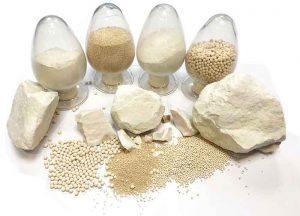What is Natural Clinoptilolite?
from https://zeolitemin.com/zeolite-science/what-is-natural-clinoptilolite/
 |
| High Purity Natural Clinoptilolite Zeolite |
High Purity Natural Clinoptilolite Zeolite
Today, There are many natural zeolites identified in the world. Clinoptilolite, mordenite, phillipsite, chabazite, stilbite, analcime and laumontite are very common forms whereas offretite, paulingite,barrerite and mazzite, are much rarer. There are over 50 types of natural zeolite mineral and more than 200 synthetic zeolites in world. Among the zeolites, Clinoptilolites (from the heulandite group) are the most abundant natural zeolite and is widely used and suitable natural zeolites type for commercial and industrial applicationsin the world.
According to the world's annual production of natural zeolite approximates 3 million tonnes, More than 80% of the world's zeolite production is clinoptilolite type of natural zeolite mineral. Apart from natural ones, many synthetic zeolite are being developed around the world for custom applications.However, only 232 synthetic zeolite of these structures have been discovered and synthesized so far, so many zeolite scientists question why only this small fraction of possibilities are being observed. Natural zeolites are abundant and low cost resources, which are crystalline hydrated aluminosilicates with a framework structure containing pores occupied by water, alkali and alkaline earth cations. Due to their high cation-exchange ability as well as to the molecular sieve properties, natural zeolites have been widely used as adsorbents in separation and purification processes in the past decades.
Clinoptilolite Zeolite Structure
Natural Zeolite Structure
Currently most of natural zeolite manfacturers process clinoptilolite at the market. However, not all zeolite products have a high content of clinoptilolite. The quality of a zeolite mineral totally depends on the clinoptilolite content of the product since the active agent (that can exchange cations) in the mineral is the clinoptilolite. Unfortunately at the market there are products that have clinoptilolite content as low as 50%, even sometimes 40%, which means that rest of the product is regular stone or clay.
Clinoptilolite possesses tetrahedral framework and form a continuous compositional series referred to as the Zeolitemin zeolites. For known more technical information about zeolite (Clinoptilolite), please visit International Zeolite Association(IZA)'s website. It was found an informing 3D animation of clinoptilolite's tetrahedral structure from their website and how it absorbs the cations into its cage like a magnet.
It forms a series with heulandite:
- Clinoptilolite-Ca – heulandite-Ca solid solution series
- Clinoptilolite-K – heulandite-K solid solution series
- Clinoptilolite-Na – heulandite-Na solid solution series
The naturally occuring zeolite Clinoptilolite consists of linked SiO4 tetrahedra. The diagram demonstrates the relationship between the trapped Caesium ion and the framework.
Specific physicochemical zeolite properties:
- high ion exchange selectivity
- reversible hydration and dehydration
- high gas sorption capacity
- high thermostability
- resistance to aggressive media
Natural zeolites are hydrated aluminosilicate minerals of a porous structure with valuable physicochemical properties, such as cation exchange, molecular sieving, catalysis and sorption. The use of natural zeolites for environmental applications is gaining new research interests mainly due to their properties and significant worldwide occurrence.
The clinoptilolite quality from Xiamen Zeolitemin Biotech Co.,Ltd was passed by SGS laboratory,Top 1 in Asia. The Purity of Clinoptilolite mineral is about 91% content. High quality Clinoptilolite are used in animal feed,aquaculture,agricultural,water treatment and construction markets.Otherwise, Low quality Clinoptilolite are mostly used as an aggregate.
Scope of application in soil conditioner (clinoptilolite zeolite)
The clinoptilolite series comprises three species. Clinoptilolite-K, Clinoptilolite-Na, Clinoptilolite-Ca named after their dominant elements. These elements are exchanged during cation exchange in favor of heavy metals, toxins, ammonia etc. which have a higher attraction for the mineral. To check how these elements are placed inside the clinoptilolite structure please check The Virtual Museum of Minerals and Molecules.
If you are interested in more information, please contact with Mr.Lee. We would provide more support in the way of zeolite technology.

没有评论:
发表评论